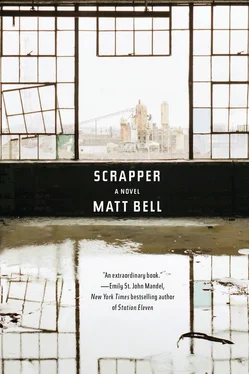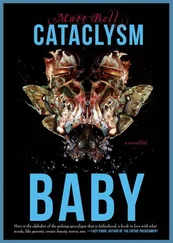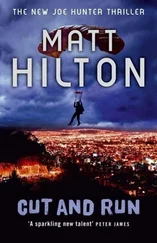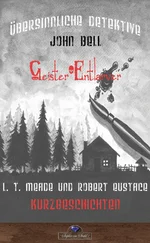Why didn’t they leave, if things were so bad.
Why didn’t we understand why, if we had homes of our own.
Inside a rotting duplex, he opened a refrigerator long unplugged and pulled its bulk away from the wall, found a carton of milk dated more recently than he’d expected. A house stayed intact as long as it had inhabitants but after they left the decay began. Wires lost their hum, pipes went dry. Doors and windows could be covered or replaced with plywood but their protection would not last and then the inquiries of thieves exposed the inside of the house, then the upper floors filled with wind and rain, the changeable weather of the Midwest. Soon every carpeted room turned to molder and rot, roofs fell through, the rats and cockroaches had their way.
A howl of wind came banging through a front door, the repeated slamming of a thrown bolt against a doorframe shivered his skin. He knew it wasn’t human voices that held back the fall of cities. It wasn’t any number of people sharing a room, wasn’t the presence of family meals. Everywhere he went he saw the quiet creep of falling down, falling in. A contest of wills, the agonies of architects against the patience of nature.
Opened to the elements the inside of a house smelled mostly like the outside. There was everywhere more emptiness than he’d imagined. The surface was void of anything valuable and so he had to go deeper. There were inferences to be drawn from the locations of outlets, junction boxes. A house changed after he saw its walls as containers. He began to understand the arcane layouts of the worlds behind walls, learned to find the bathroom before he went looking for the pipes. He opened the walls with a sledge and the older the house the more copper he found. He wrapped his gloves around the jacketing of wires and leaned back, leveraging his weight toward the snap. Or else he took a hacksaw to a piece of pipe, catching it before it fell into the wall.
He kicked through a plaster wall and after he withdrew his foot he found the remains of a squirrel nestled against the studs. Tiny skull, tiny feet, all the clamber long ago gone out of it. He cradled the bones, walked slowly toward the back of the house, the bouncing screen door he’d left open. Halfway there he caught himself in the last arc of a busted mirror. What was he doing here. What jumble of bones and the past was in his hands. What was he doing and why.
Outside another house, he found a broken window, cleared the glass to grant access to the interior. The house’s first floor skewed back a couple of decades, gave off a story of wood paneling and thick carpet, avocado appliances. The furniture was mostly gone except for a sagged couch propped against the front wall of the living room, its seats facing in, and in another room he found a busted dresser, missing its drawers. He thought it was possible to underestimate how many people had lived in each room, the distance between the ideal and the necessary. Kelly had grown up in his own bedroom but his father had shared his with two brothers. His grandfather had been born in a one-room house, home to nine brothers and two parents, the ghosts of three miscarriages and a stillborn daughter. Theirs was a family of men, no women except the ones they were born to or married. And of all the men in this family it was only Kelly who had never married, never bred.
He worked within the zone during the day where he could and at night where he couldn’t. In the deep dark of unlit streets there was less chance of being disturbed but the need for light gave away his position. He wore a headlamp strapped around his forehead but the light meant others could see him moving. Sometimes he thought he saw shapes swarming outside the windows. If he heard a voice call out in the darkness, then he paused where he was. If he heard two voices he shut off his headlamp and let the darkness reshape his pupils. He didn’t have much imagination left but what imagination he had he thought he could do without.
After the fire, the ringing he heard in his ears never went fully away, but it got worse when he did too much, worked too hard, pushed himself inhuman. Sometimes in the dark he stood still and listened to it sing.
He didn’t carry a weapon, didn’t keep one in his truck. If he bought a gun he would always know where it was and one day he would use it. But often there was a tool in his hands, a hammer perhaps, and even if his hands were all he had it didn’t mean they couldn’t be used to defend himself, to fight back, to hurt in turn.
At the hospice shop the newest clothes went the fastest. He pledged anew his old loyalties to the state’s teams, showed his allegiance with t-shirts in team colors. He thought he’d kept up while he was away but if he recognized a name on the back of a shirt maybe the player had been retired for years. The oldest shirts were three for a dollar fifty and if one fit he bought all three.
If he had to buy his soap at the hospice shop he worried it was the soap of the dead. Some weeks he could afford better but he’d traveled to the city with a new frugalness and he was determined not to chase it away. He walked the shop, wondered whose life the photo frames had contained. He wasn’t ever in a hurry. He had to hustle to do enough work but it hardly took his whole week. He thought he would like reading a book inscribed with someone else’s marginalia but when he got the book home he found he didn’t need the voices of more ghosts. That was already what reading was.
This was his year of diminishment. Less was all there was. Even where there were people left there wasn’t any of the commerce people needed to make good. He bought his cereal in the same place he bought his beer and the two choices were flakes with sugar, flakes without. There was hardly anything fresh on the shelves anywhere. At best a bowl of apples next to the cash register, a couple bananas under the cigarettes, beside the lotto tickets.
He didn’t believe in luck but he believed in bananas.
A new twelve-pound sledgehammer was forty dollars, replacement handles fourteen. A pipe cutter cost twenty dollars, tinner snips thirteen. A heavy cable cutter might run one hundred ninety. He could make any purchase worth it but he had to be sure. He was never sure. The locking toolbox for the truck had cost three hundred dollars but his tools were safer there than in his apartment. His truck became his most necessary possession: an all-new chassis the better year he’d made the purchase, a multidisplacement V-8 under the hood. Live axles for maximum longevity and durability. Inboard dash navigation, maps swinging with the sweep of overhead satellites. An anxiety of attractive credit terms, secured with a down payment of wages earned and a loan guaranteed by the promise of more paychecks which had not come.
He bought a lamp, a folding table, a pair of unmatched chairs. His bedroom was small, his bathroom smaller. There were just the two rooms. There was more room than he needed. He bought dishes and utensils and a glass and a mug, took them home to the kitchenette barely hidden behind a thin wall. He had to listen to the refrigerator cycle while he tried to sleep. The apartment sat on the first floor of a converted motel, with other apartments on both sides, behind and above. During the day he had to listen to two children crisscross the floor above him for hours. As if running were so novel an activity they might never quit. At night he heard the laughter of loud men, the anger of shrill women, the frustrations of both sexes. A cheap apartment meant living in a cloud of your neighbors, their sounds and smells, the obscene evidence of their activities. He had to turn the television up at least as loud as his neighbors or he couldn’t understand the shows. Often the nightly news became a lesson in lip-reading but he watched until he’d seen both the weather and the blonde reporter, smart in her pantsuits.
Читать дальше












